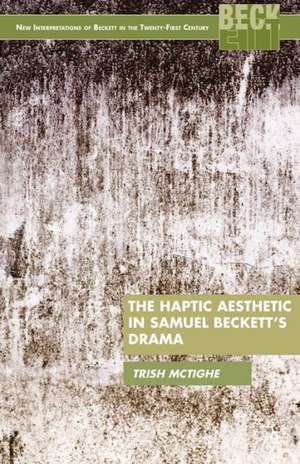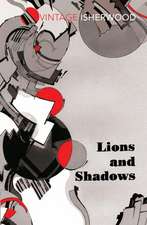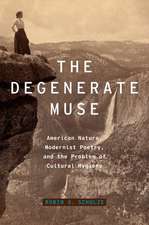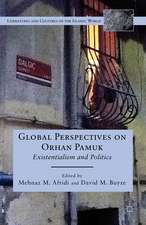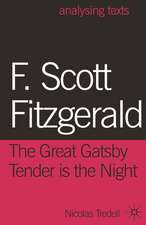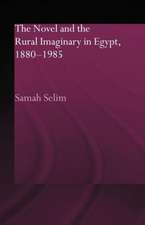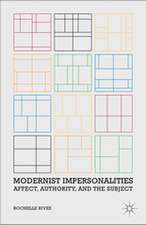The Haptic Aesthetic in Samuel Beckett’s Drama: New Interpretations of Beckett in the Twenty-First Century
Autor P. McTigheen Limba Engleză Hardback – 17 iun 2013
| Toate formatele și edițiile | Preț | Express |
|---|---|---|
| Paperback (1) | 378.04 lei 6-8 săpt. | |
| Palgrave Macmillan US – 17 iun 2013 | 378.04 lei 6-8 săpt. | |
| Hardback (1) | 383.01 lei 6-8 săpt. | |
| Palgrave Macmillan US – 17 iun 2013 | 383.01 lei 6-8 săpt. |
Preț: 383.01 lei
Nou
Puncte Express: 575
Preț estimativ în valută:
73.34€ • 75.57$ • 61.55£
73.34€ • 75.57$ • 61.55£
Carte tipărită la comandă
Livrare economică 21 februarie-07 martie
Preluare comenzi: 021 569.72.76
Specificații
ISBN-13: 9781137276988
ISBN-10: 1137276983
Pagini: 196
Ilustrații: IX, 196 p.
Dimensiuni: 140 x 216 x 18 mm
Greutate: 0.36 kg
Ediția:2013
Editura: Palgrave Macmillan US
Colecția Palgrave Macmillan
Seria New Interpretations of Beckett in the Twenty-First Century
Locul publicării:New York, United States
ISBN-10: 1137276983
Pagini: 196
Ilustrații: IX, 196 p.
Dimensiuni: 140 x 216 x 18 mm
Greutate: 0.36 kg
Ediția:2013
Editura: Palgrave Macmillan US
Colecția Palgrave Macmillan
Seria New Interpretations of Beckett in the Twenty-First Century
Locul publicării:New York, United States
Cuprins
Introduction: Haptics, Aesthetics, Philosophy 1. Eye: Failing, Myopic, Grainy 2. Ear: Full of Relentless Echoes 3. Mouth: Trying to Tell it All, Failing 4. Skin, Space, Place 5. On the One Hand . . . (The One that Writes the Body) 6. On the Other Hand . . . (The One that Refuses to Touch) Conclusion: Departing Bodies, Between Doubting Thomas and Noli me Tangere ?
Recenzii
"McTighe, in an elegantly written, wide-ranging study of Beckett's dramas, focusing mainly on the late plays but relevant to his entire corpus, provides an original and much-needed way of approaching the complex issues related to Beckett's depiction of bodies - at once material yet intangible, solid yet fragmented, there yet not there - and the equally complex issues arising from such tensions and contradictions. Building on theories of Maurice Merleau-Ponty and Jean-Luc Nancy, McTighe argues for the importance of the haptic or tactile in approaching not only the physical but also the philosophical, religious, ethical, artistic, and performative forms and failures of contacts and connections through touch in Beckett's works. In carefully-argued close readings of selected plays, divided into chapters according to a particular sensory organ of touch - eye, ear, mouth, skin, hand - she illustrates how Beckett creates bodies as material presences which deny the possibilities of their own materiality, as delineations which ultimately point to the impossibility of delineation of somatic experience in art and life." - Linda Ben-Zvi, Professor Emerita, Theatre Studies, Tel Aviv University, Israel
"The Haptic Aesthetic in Samuel Beckett's Drama is a beautifully written and imaginatively structured exploration of acts of touch or not touching in Beckett's drama for stage and screen. The book's striking originality and significance lie in its lively engagement with a rich set of aesthetic and critical writing on the haptic, making an important contribution to studies of Beckett and phenomenology, aesthetics, embodiment, and technology. Nancy's interpretation of touch connects it with Christian iconography and McTighe weaves discussions of doubting Thomas and the Noli me Tangere scene between Christ and Mary Magdalene throughout the book, exploring touch at the borderline between visceral flesh and the resurrected 'body of light', the withdrawal of touch, and forms of tactful or ethical touching. Offering compelling new readings of Beckett's drama for stage, film, and television, McTighe demonstrates beyond doubt the centrality of touch in all its senses and complexities to Beckett's work." - Anna McMullan, Professor of Theatre, University of Reading, UK
"The Haptic Aesthetic in Samuel Beckett's Drama is a beautifully written and imaginatively structured exploration of acts of touch or not touching in Beckett's drama for stage and screen. The book's striking originality and significance lie in its lively engagement with a rich set of aesthetic and critical writing on the haptic, making an important contribution to studies of Beckett and phenomenology, aesthetics, embodiment, and technology. Nancy's interpretation of touch connects it with Christian iconography and McTighe weaves discussions of doubting Thomas and the Noli me Tangere scene between Christ and Mary Magdalene throughout the book, exploring touch at the borderline between visceral flesh and the resurrected 'body of light', the withdrawal of touch, and forms of tactful or ethical touching. Offering compelling new readings of Beckett's drama for stage, film, and television, McTighe demonstrates beyond doubt the centrality of touch in all its senses and complexities to Beckett's work." - Anna McMullan, Professor of Theatre, University of Reading, UK
Notă biografică
Trish McTighe is a teaching assistant in the department of Drama Studies in the School of Creative Arts at Queen s University Belfast.
